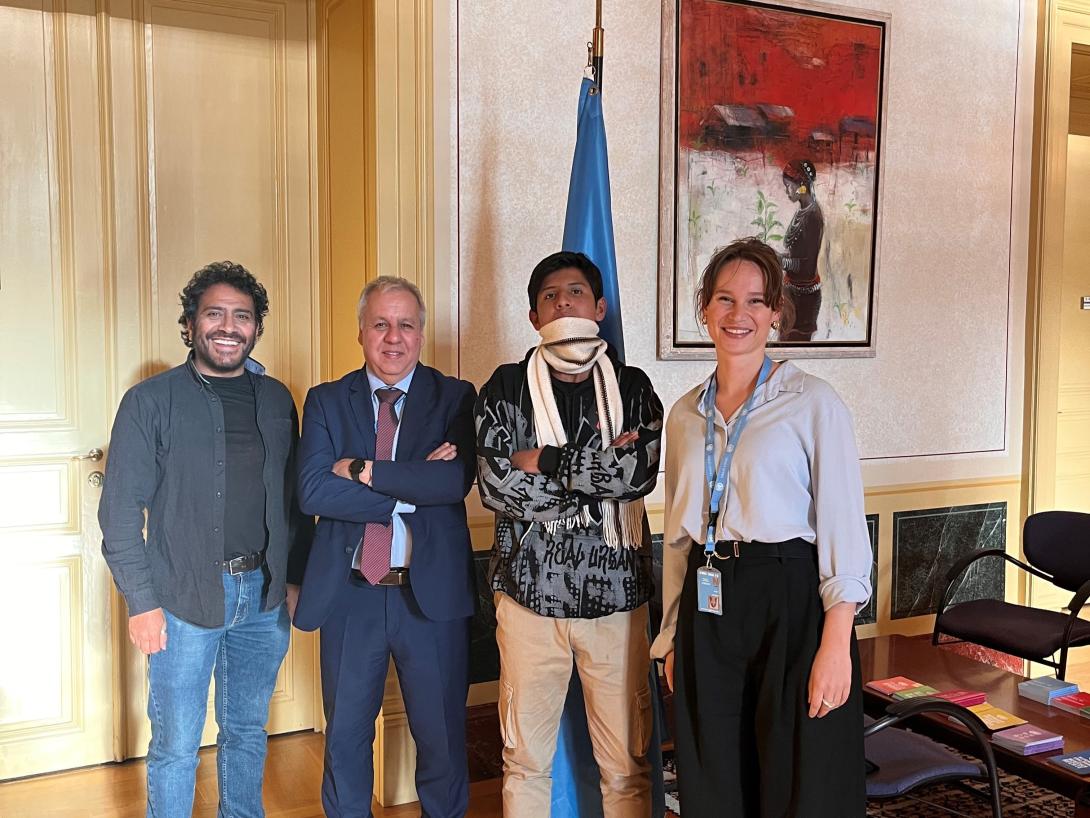

Every year on 20 November, we celebrate World Children's Day. Like all others, children in street situations have rights. Yet all too often they are victims of stigmatisation, discrimination and violence. On this international day, we're giving them a chance to have a say: read the testimony of Erick, a young Peruvian supported by our partner Qosqo Maki, who came to speak at the United Nations in Geneva.
After spending a few days in Geneva, partly at the Palais Wilson, the headquarters of the Office of the United Nations High Commissioner for Human Rights, 17-year-old Erick still can't get over it. And for good reason! Just a few years ago, he was surviving on the streets of Cusco. Me, the rebel, my mother dead, my father living in the Amazon part of Peru, expelled from school and from the first centre for minors, angry with my sister, I didn't have much hope’, he confides. Fortunately, Qosqo Maki made me feel welcome.I like this association because, even though I have to stick to a very precise timetable, I feel free and respected. And I'm learning the bakery trade. On 16 September, I was very honoured to represent children in street situations at the United Nations and to talk about our daily lives, our difficulties and our hopes too. Things that are essential if we are not to feel forgotten, and if we are to be able to integrate into society and build our future like any other young person.
Our association does everything it can to improve the living conditions of children and teenagers who work and survive on the streets," explains Jorge Roldan del Solar, educator and team leader of the Peruvian association Qosqo Maki. The first thing we offer them is a place to stay.On a daily basis, they take part in workshops on tutoring, theatre, raising awareness of children's rights, and learning the trades of carpenter, baker and barista. We teach them how to manage a common fund, encourage them to exchange ideas with other young people and adults in the neighbourhood, and meet tourists interested in this social and solidarity project. And, depending on their abilities, talents and skills, we work with them to develop a life project. Then we guide them along the path to citizenship, responsibility and independence. So that they become aware of their rights, their duties, their freedom of expression and their capacities.
On 16 September, with their report in hand, Erick and Jorge told the diplomats gathered at the United Nations in Geneva that there was still a long way to go before every child or adolescent in street situations could fully enjoy their rights: non-discrimination, the best interests of the child, the right to live, survive and develop, respect for their opinions... even though the Convention on the Rights of the Child was adopted on 20 November 1989!
In Peru, in order to access vocational training, young people must have completed their secondary education and/or come of age," explains Jorge Roldan del Solar. Many give up because the level of discipline and knowledge required is too high for them, or because they can't combine studying with odd jobs to pay for it. With no real qualifications, they end up on the streets, victims of abuse and exploitation, or employed in dangerous jobs such as mines. If the State allowed us to give them not an official diploma - it's the only one that can do that - but a certificate attesting to their experience and sense of responsibility in our workshops, young people in street situations would have a better chance of finding a job and less chance of being exploited or physically or emotionally abused. With a little more flexibility and recognition, we could make a big difference. Like all the children and teenagers in the world, young Peruvians in street situations must be able to live with dignity in society. They are the future and ‘the hands of Cusco’, Qosqo Maki in Quechua. At Qosqo Maki, I learnt patience,’ concludes Erick. And, in Geneva, the diplomats congratulated us on our two reports... so..."
I lived on the street from 2012 to 2013, selling sweets until the day another child dragged me to the Qosqo Maki centre. After three years, I agreed to go back to college and work in carpentry before falling in love with baking. Today, I'm doing a course in gastronomy, I dream of opening my own restaurant and why not work as an educator at Qosqo Maki. I want to move forward and help children in street situations as I have been helped.Michaelformerly in a street situation, supported by Qosqo Maki
Qosqo Maki for the present and future of young Peruvians
To make its voice heard by local, national and international authorities, our partner Qosqo Maki, a Peruvian association set up in 1990, is forging close links with other associations working with children and teenagers in street situations and defending their rights. It also takes action on 12 April, International Day for Street Children, and on 20 November, World Children's Rights Day.
